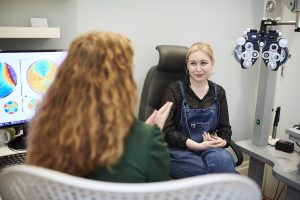How Young is Too Young for Laser Eye Surgery?

Laser Eye Surgery is becoming increasingly common as developments in the field make the procedure suitable for more people. While many benefits of the treatment are obvious – such as the freedom of life without glasses and contacts! – others may surprise you. For example, Laser Eye Surgery could be one of the most sensible economic investments you can make.
But if having Laser Eye Surgery could save you money on contacts and glasses in the long run, is it better to have treatment when you are younger? And how young is too young for Laser Eye Surgery? Let’s find out.
While Laser Eye Surgery has become an option for more people than ever before, there are some circumstances in which it may not be suitable. For example, certain conditions can be a contraindication for the procedure. But there are also certain times in a person’s life when they may be temporarily unsuitable for the treatment. This may be due to pregnancy or breastfeeding – or simply their age.
Counting Down the Days to Laser Eye Surgery
The thing with refractive errors is, they don’t discriminate. Long-sightedness (hyperopia), short-sightedness (myopia), and astigmatism can affect people of any age – old and young. Unfortunately, the younger glasses and contact lens wearers among us will have to wait a while before they can have Laser Eye Surgery.
In some cases, this might mean dealing with glasses for a few more birthdays, festivals, or holidays. But why does age have a role to play in our suitability for Laser Eye Surgery?
Let’s take a look at the case of Thomas, the son of one of our part-time members of staff, Cindy. Having been short-sighted since the age of three, Thomas had been interested in sports, particularly running, throughout his childhood. But when he began taking running more seriously at university, his sight issues became increasingly annoying.
“He had been using contact lenses, and glasses for driving for some time, but he really wanted to have his sight corrected with Laser Eye Surgery for ages,” Cindy told us.
However, like many young people, Thomas would have to wait a while before the procedure could be carried out in complete safety.
Holding Out for a Stable Prescription
Our teenage years can bring a whole series of new experiences. But perhaps the most disruptive factor in these formative years is our hormones. At this time, hormone changes cause a wide range of changes in our bodies but changes that many of us don’t consider are those that affect our eyes.
For those who require vision correction, hormone changes can cause fluctuations in your prescription. Unfortunately, this instability directly impacts your suitability for Laser Eye Surgery.
A stable prescription is required to perform Laser Eye Surgery safely and successfully. For this reason, guidance from the Royal College of Ophthalmologists states that the procedure should not be performed on patients younger than 18 years; however, in reality, it may not be safe to operate on some people until the age of 21 or older.
Thomas had his first eye test to check his suitability for Laser Eye Surgery in his late teens. Unfortunately by the age of 21, his prescription was still considered too unstable to undergo the procedure. We require patients’ prescriptions to be stable for at least a year before we will perform Laser Eye Surgery.
Thankfully, by the age of 24, Thomas had undergone successful treatment at the London Vision Clinic and is now enjoying his passion for running without the interference of glasses and contact lenses!
The Emergence of Underlying Conditions
But waiting til you are older to have Laser Eye Surgery doesn’t only come down to your prescription. There are also some underlying medical conditions that don’t present themselves until we are older – some of which can affect your suitability for the procedure.
Our expert Laser Eye Surgeon, Mr Glenn Carp, explains:
The genetic condition known as keratoconus is the main one. It is something that you are born with but which won’t show up until your eyes and body are more mature. In this condition, the cornea becomes weak and begins to thin on its own. A laser, used to reshape it could cause it to become unstable resulting in possible problems in later life.
That is why we are so careful to check for this condition — on average it affects one person in 2,000 and is especially common in people who wear glasses. It can be hard to pick up the extremely subtle early signs of this disease in the young — in older people, it will show itself in the cornea.”
As you can see, while there are general guidelines as to a minimum age for Laser Eye Surgery, this can vary from person to person. The only way to know for sure (if you are over the age of 18) is to have a comprehensive eye exam to check your eye health and the stability of your prescription.
If you’re interested in Laser Eye Surgery, get in touch with one of our friendly clinic coordinators who will be able to provide professional advice. Alternatively, Book a free, no-obligation consultation today.


